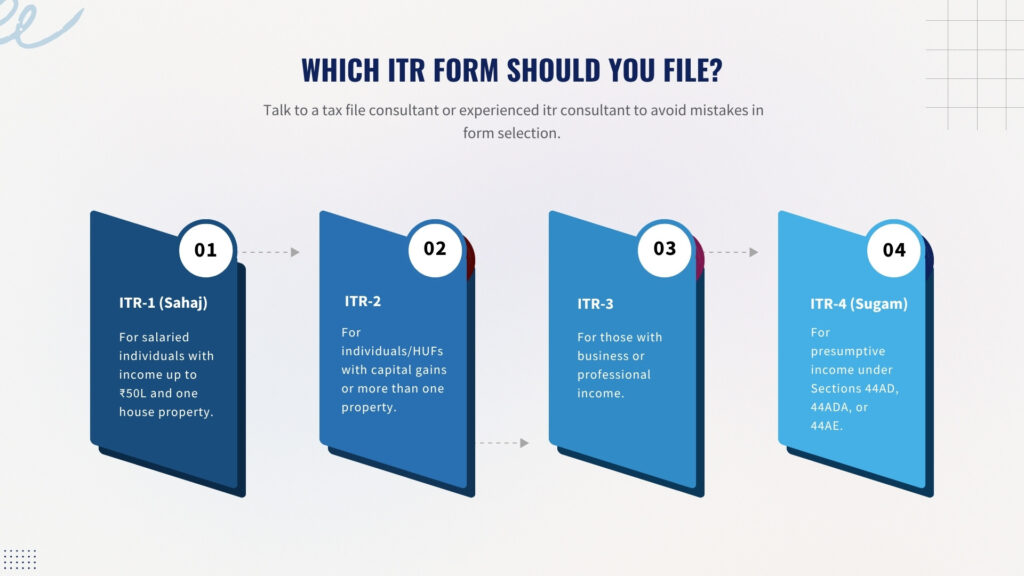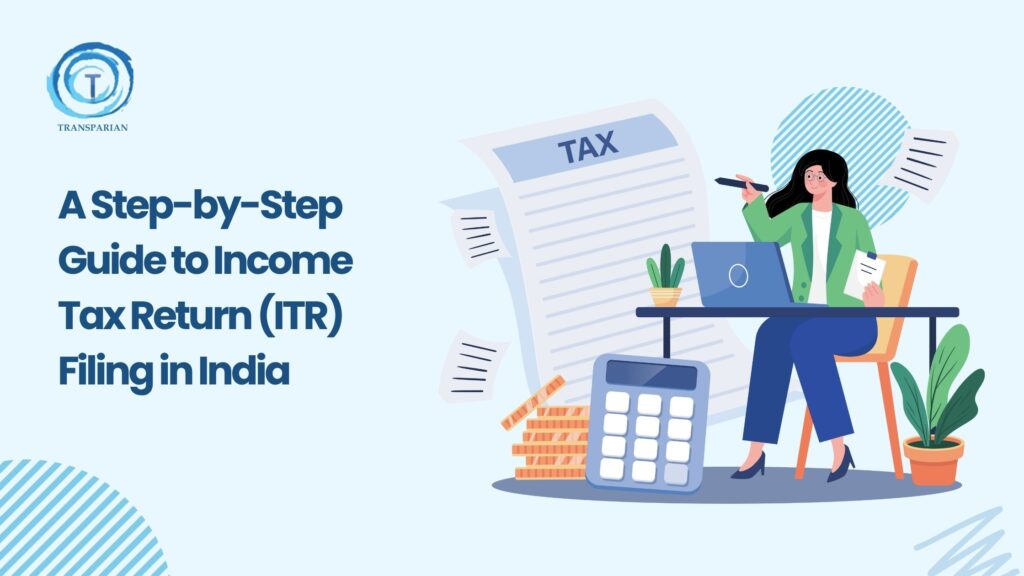Filing Income Tax Return (ITR) in India is usually a daunting matter, particularly considering the regular changes within the regulation and being introduced by digitalisation. As a salaried employee, self-employed, a freelancer or NRI, you should know the step-by-step procedure and the details that most guides will miss because you need to comply, make maximum refunds, and not invite penalties. This detailed tutorial not only explains the general ITR filing process but also covers overlooked situations and answers the most frequently asked questions in 2025.
What is Income Tax Return (ITR) Filing?
The Income Tax Return filing can be defined as a formal activity that includes declaration of your total income, canting of eligible amount of deductions, payment of any amount of tax remaining, and submission of your return form to the Income Tax Department before the stipulated date .If your income exceeds the basic exemption limit, you must file your return. Others also choose to file to get loans, visas, or carry forward losses, as it offers key advantages. But many others also choose to file—for loan or visa applications, or to carry forward losses—because it offers significant advantages.
Step 1: Understand Your Filing Requirement
The first step is to check whether you need to file an ITR. You must file if:
- Your gross total income exceeds the basic exemption limit (₹2.5 lakh for individuals under 60)
- You have foreign assets, cryptocurrency gains, or are a director in a company
- TDS has been deducted and you want to claim a refund
- You need to carry forward a loss (e.g., capital loss or business loss)
- You wish to apply for a loan, visa, or government tender
Step 2: Collect the Necessary Documents
A common mistake is not having proper documentation before filing. Keep the following ready:
- PAN and Aadhaar card
- Form 16 from your employer
- Form 26AS, AIS (Annual Information Statement), and TIS (Taxpayer Information Summary)
- Bank interest certificates
- Details of capital gains from mutual funds or stocks
- Proof of deductions: LIC premium, 80C, 80D, 80G, home loan interest, etc.
- Rent receipts for HRA, if applicable
Consulting with a tax consultant in India or leveraging trusted e tax solutions can help ensure these are complete and up to date.
Step 3: Choose the Right ITR Form

Selecting the wrong ITR form is one of the top reasons for a defective return. Here’s a brief breakdown:
- ITR-1 (Sahaj): For salaried individuals with income up to ₹50 lakh and one house property
- ITR-2: For individuals and HUFs with capital gains or multiple properties
- ITR-3: For those having income from business/profession
- ITR-4 (Sugam): For presumptive taxation scheme under Section 44AD, 44ADA, or 44AE
If unsure, speak with a tax file consultant or trusted itr consultant to avoid filing errors.
Step 4: Log In to the Income Tax Portal
Visit the official Income Tax e-filing portal at https://www.incometax.gov.in
- Login using PAN/Aadhaar
- Choose the Assessment Year 2025–26
- Click on “File Income Tax Return”
- Select “Online” mode (or “Offline” if you are using the Excel utility)
This is where most new users pause—an income tax consultant or provider of itr filing services can offer login support, especially if you’re filing jointly or for a business.
Step 5: Pre-fill & Validate Personal and Income Details
The income tax portal now provides pre-filled ITR forms using AIS, TIS, and Form 26AS data. Review these carefully:
- Salary income (verify with Form 16)
- Interest from savings and FDs
- Dividend income
- Capital gains/losses
- TDS/TCS details
Manually correct or add anything missing. Many individuals also forget to declare exempt incomes, such as PPF interest or gratuity—this can raise future red flags.
Step 6: Take Deduction & Tax Reliefs
It is here that tax planning comes in handy. You will save tax upon:
- Section 80C – LIC, PPF, EPF, ELSS
- Section 80D – Medical insurance premiums
- Section 80E – Education loan interest
- Section 80G – Donations to charities
- Section 24(b) – Home loan interest (₹2 lakh max)
- Section 10 – HRA, LTA, etc.
When making a filing under the old tax regime, then make all allowable deductions. The new regime offers reduced tax slabs but eliminates most exemptions. It is advisable to discuss your best fit regime with a tax consultancy firm or itr consultant before submitting.
Step 7: Calculate Tax Liability and Pay Dues
All you need to do is to verify income and deductions and the system auto-computes the amount that you owe in taxes:
- In the event that you pay tax, produce a Challan 280 and pay it online.
- In case of advance tax or self assessment tax give payment details and then continue.
A tax consultancy firm ensures timely calculation and payment of interest on late payments under sections 234A, 234B, and 234C to avoid further notices.
Step 8: Preview, Validate, and Submit the Return
Before submitting, double-check:
- Your bank account is pre-validated
- Income figures match with Form 16, AIS, and 26AS
- Deductions and exemptions are correctly applied
- TDS credits are fully claimed
As a business, ensure you update your GST turnover, professional receipts, and balance sheet accurately.
ITR filing services allow having tools of cross-validation that will prompt mismatches or ensure timely notice. This step can be simplified by partnering with a tax consultant in India when you are a freelancer, trader or a consultant.
Step 9: e-Verify Your ITR
Filing isn’t complete until you e-verify your return. You can verify via:
- Aadhaar OTP
- Net banking
- EVC through bank account or Demat
- Digital signature certificate (DSC) – mandatory for companies and audit cases
Unless proved within 30 days, your comeback is not valid. This is where a consultant in tax file files will make the customers not to miss verification and meeting deadlines.
Step 10: Check Acknowledgment & Refund Status
Once it is submitted and verified, you will also get an ITR-V (acknowledgment) on your email or dashboard. When you are eligible to get a refund, this normally takes between 20-45 days.
You can track the refund status using the link on the portal or through NSDL. Watch also:
- CPC intimation under Section 143(1) – for acknowledgment or adjustment
- Defective return notices – if there’s a mistake
- Refund reissue – if earlier account details were invalid
In case of difficulty in tracking, or realization notice, you may consult e tax solutions who are experienced or an income tax consultant.
Bonus: Topics Most People Miss –
Following are the points, which are mostly ignored by individuals during filing of ITR:
- Income in Other Countries and Crypto Assets
NRIs, crypto investors, or those with overseas holdings must report foreign income or assets. The setting up of a judgement of non disclosure can invite sanctions under the black money Act.
- Updating the ITR (ITR-U)
The Section 139(8A) allows you to file an Updated Return in case you have failed to file or have committed an error within 2 years. This is accompanied with extra taxation and evades conviction.
- Agriculture Income & Exempt Sources
Although agricultural income is exempted, it is to be mentioned as a basis of applicability of rates. On the same note, you should also report exemptions like PF withdrawal after 5 years, inheritance, or gifts below ₹50,000.
- ITR by Senior Citizens and Pensioners
Section 80 TTB benefits and Exemption to high amounts can be availed by many old age citizens. Moreover, when they only earn pension+ interest, then ITR-1 is usually adequate.
- Choosing the Correct Regime Every Year
Non business/professional taxpayers can change between old and new regimes annually on the basis of deductions or slab benefits.
An effective itr filing service provider will make you bear such nuances in mind so that to save as much as possible and to make sure that you will not violate any law.
How tax consultancy services and itr filing services Help
The safest way to address the complexities of ITR filing is where the person has multiple sources of income or meets multiple requirements when it comes to filing ITR. And that is why tax consultancy services, filing services and a professional income tax consultant or tax consultant in India come in handy. They ensure:
- Data entry and proper selection of forms
- Rightful assertion of deductions and exemptions
- Adherence to new rules of tax regime
- Prompt counteractions to notices and corrections
- Special guidance to NRIs, freelancers, and owners of business interests
Besides bulking filing services to corporates, TDS, and GST compliances, tax consultancy firms also provide tax consultancy services and advisory on investments opportunities that help to save tax. On the one hand, in case of special requirements, eg. cryptocurrency reporting, internet gaming, or farming income, a professional itr professional or tax file professional can cost-effectively avoid the most common errors.
FAQ’s
Any individual whose gross total income exceeds the basic exemption limit (₹2.5 lakh for those under 60), or who has foreign assets, is a company director, or needs to claim a tax refund must file an ITR.
You’ll need your PAN, Aadhaar, Form 16, Form 26AS, AIS/TIS, bank interest certificates, proof of investments under Section 80C, and any documents related to capital gains, loans, or rental income.
The due date is 31st July 2025 for most individuals not requiring audit. Filing after the deadline attracts a late fee and interest.
You can e-verify using Aadhaar OTP, net banking, bank EVC, or DSC. Verification must be done within 30 days of filing.
Use the “Check Refund Status” link on the Income Tax Portal or visit NSDL’s refund tracking page using your PAN and assessment year.

